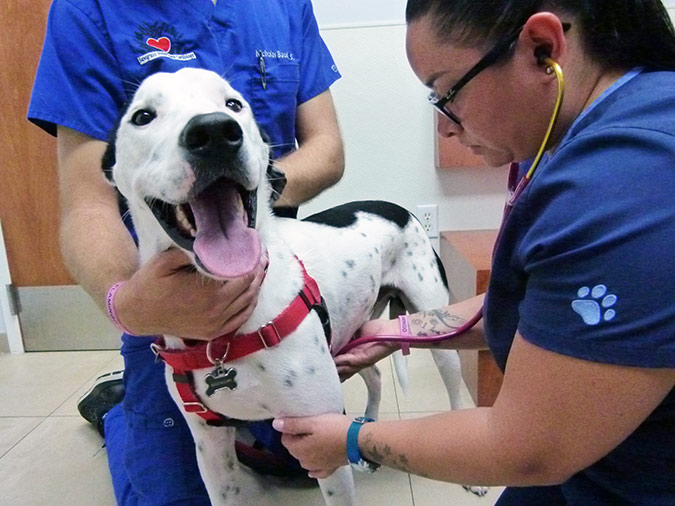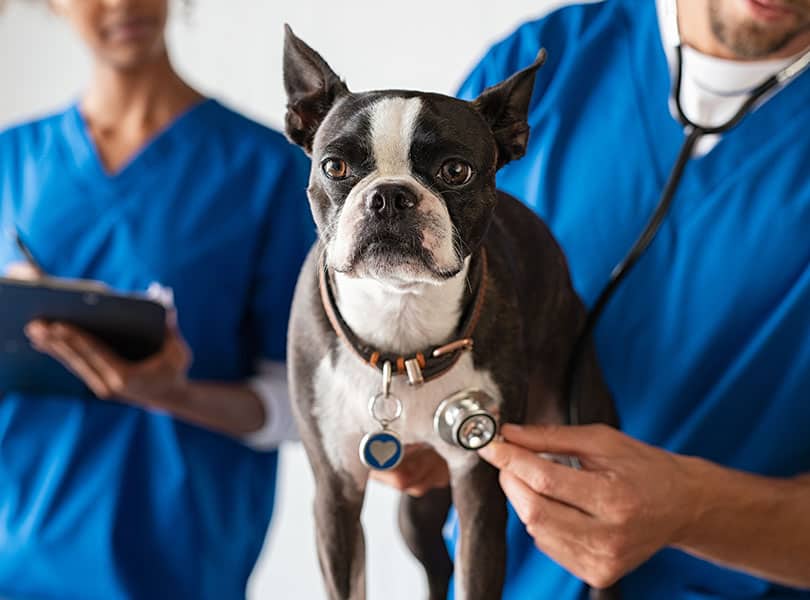Discovering the Necessary Services Provided by a Vet Cardiologist: Recognizing Ultrasound and CT Scan Methods
Veterinary cardiologists play a crucial duty in the health of family pets by detecting and treating various heart disease. They utilize innovative imaging strategies, such as cardiac ultrasound and CT scans, to offer precise evaluations. Each technique has its unique benefits and applications. Recognizing these strategies is important for animal proprietors seeking the very best care for their companions. What elements should family pet proprietors consider when choosing in between these analysis devices?

The Role of Veterinary Cardiologists in Family Pet Medical Care
Veterinary cardiologists play a vital role in the health care of pet dogs, concentrating specifically on identifying and dealing with heart-related conditions. They have specialized training that permits them to analyze complex diagnostic tests and determine different cardiovascular problems. These specialists make use of advanced techniques, such as echocardiography and electrocardiography, to assess heart function and structure accurately.Veterinary cardiologists also develop tailored therapy plans that may include medicines, way of life alterations, and, in many cases, surgical treatments. Their knowledge reaches informing family pet proprietors regarding heart health, stressing the significance of regular check-ups and early discovery of possible troubles. Cooperation with basic veterinarians is important, as it guarantees extensive care for pets with presumed cardiac issues. By offering specialized solutions, vet cardiologists considerably improve the lifestyle for pets and provide comfort for their owners, reinforcing the relevance of heart health and wellness in general family pet wellness.
Common Heart Issues in Pet Dogs
Typical cardiac issues in pet dogs can considerably affect their health and lifestyle. Heart murmurs, numerous kinds of cardiomyopathy, and hereditary heart problems are amongst the most widespread conditions that vets experience. Ultrasound For Dogs. Comprehending these issues is essential for family pet proprietors to ensure prompt diagnosis and ideal therapy
Heart Murmurs in Pets
Heart whisperings can be a source of issue for pet owners, they are not constantly a measure of major health and wellness concerns. A heart whispering is an irregular audio produced by rough blood circulation within the heart. In pet dogs, these murmurs can be triggered by various elements, consisting of genetic heart issues, valve issues, and even anxiety during assessments. Several pets with heart murmurs lead normal lives without significant health influences. To determine the underlying cause, veterinary cardiologists typically utilize diagnostic methods such as echocardiograms and Doppler ultrasounds. Early detection and assessment are vital, as they may help take care of any type of possible cardiac issues efficiently. Animal owners are encouraged to consult their veterinarian for a complete evaluation if a heart murmur is detected.
Cardiomyopathy Kind Explained
Cardiomyopathy incorporates a team of illness affecting the heart muscle mass, causing jeopardized cardiac feature in pet dogs. One of the most typical types consist of expanded cardiomyopathy (DCM), hypertrophic cardiomyopathy (HCM), and restrictive cardiomyopathy (RCM) DCM mostly impacts dogs, creating the heart to deteriorate and enlarge, which lessens its capability to pump blood successfully. In contrast, HCM is extra widespread in pet cats, defined by the enlarging of the heart wall surfaces, frequently resulting in blocked blood flow. RCM, though less usual, occurs when the heart muscular tissue ends up being rigid, limiting its capacity to fill with blood. Each kind presents one-of-a-kind difficulties in medical diagnosis and treatment, demanding specialized veterinary cardiological evaluation to assure peak management and take care of affected pets.
Hereditary Heart Problems
Congenital heart flaws stand for a significant classification of heart issues in pet dogs, unique from acquired conditions such as cardiomyopathy - Board Certified Veterinary Cardiologist. These flaws are structural abnormalities existing at birth, influencing the heart's normal function. Typical kinds consist of patent ductus arteriosus, ventricular septal problems, and pulmonic stenosis. Symptoms may differ extensively, varying from mild to severe, and can include exercise intolerance, coughing, and difficulty breathing. Early diagnosis with sophisticated imaging methods like ultrasound is essential for effective management. Veterinary cardiologists play a crucial duty in identifying these problems and advising ideal therapy alternatives, which may include medical management or surgical intervention. Recognizing congenital heart problems enables better outcomes and enhanced top quality of life for affected pet dogs
Comprehending Heart Ultrasound: How It Works
A significant number of vet techniques currently utilize cardiac ultrasound as Visit Website a necessary analysis tool for assessing heart health in animals. This non-invasive technique makes use of high-frequency audio waves to produce photos of the heart's framework and feature. During the treatment, a veterinary specialist applies a gel to the pet's breast and uses a transducer to release ultrasound waves. These waves bounce off the heart and surrounding structures, creating real-time pictures on a monitor.Veterinarians can assess numerous elements of heart health and wellness, consisting of chamber size, wall surface movement, and valve feature. Additionally, heart ultrasound enables for the detection of problems such as liquid accumulation and genetic heart problems. This strategy is important for diagnosing problems that may not be noticeable through basic radiographs. By giving in-depth details concerning the heart's makeup and performance, heart ultrasound help in creating effective therapy strategies for animals experiencing cardiovascular disease.
The Value of CT Checks in Diagnosing Heart Issues
Just how do CT scans boost the diagnosis of heart disease in vet medicine? CT scans supply thorough cross-sectional pictures of the heart and bordering structures, enabling vets to imagine complicated physiological relationships. This imaging technique is especially useful in recognizing congenital heart problems, cardiac growths, and problems in capillary. By utilizing innovative imaging formulas, CT scans can assess heart chamber sizes and function, providing a thorough view that may be tough to attain with traditional methods.Additionally, CT angiography can visualize blood flow and identify areas of stenosis or obstruction, which is crucial for preparing possible treatments. The rate and accuracy of CT scans also help with fast medical diagnoses, essential in emergency situation scenarios. Inevitably, the unification of CT checks right into vet cardiology greatly improves the accuracy of diagnoses, making it possible for targeted therapy strategies and boosting person end results for animals dealing with heart disease.
Comparing Ultrasound and CT Check Techniques
While both ultrasound and CT scans are vital tools in vet cardiology, they supply unique advantages and limitations that affect their usage in identifying heart conditions. Ultrasound, or echocardiography, provides real-time imaging of the heart's framework and function, allowing vets to evaluate heart chambers, shutoffs, and blood flow. It is particularly reliable for examining conditions like congestive heart failing and cardiomyopathy. Nevertheless, ultrasound may be restricted in envisioning specific anatomical frameworks due to person dimension or obesity.In comparison, CT scans offer in-depth cross-sectional pictures of the heart and bordering tissues, making them excellent for determining structural irregularities, tumors, or vascular issues. CT scans provide thorough understandings, they call for sedation and may include radiation direct exposure. Ultimately, the option in between ultrasound and CT checks depends on the details professional scenario, the client's problem, and the details required for an exact diagnosis.
Therapy Choices Offered Through Veterinary Cardiology
Veterinary cardiology provides a series of treatment choices tailored to deal with different heart problems in pets. Treatment plans often begin with lifestyle modifications, including diet modifications and exercise adjustments, aimed at enhancing overall heart health and wellness. Medicines play a crucial function, with cardiologists recommending drugs such as diuretics, beta-blockers, and ACE inhibitors to boost and take care of signs cardiac function.In much more severe situations, interventional procedures, such as balloon valvuloplasty or stent placement, might be essential to relieve clogs or enhance blood flow. For sure congenital heart defects, medical choices may be discovered to remedy structural concerns. In addition, recurring tracking and follow-up care are crucial parts of a detailed treatment plan, permitting for timely adjustments based on the pet dog's action to therapy. Generally, veterinary cardiology concentrates on giving efficient, individualized treatment to optimize the health and wellness and well-being of pet patients with heart conditions.
Just how to Prepare Your Family Pet for a Heart Examination
Preparing a pet click here now for a heart evaluation is vital to ensure accurate results and a smooth process. Owners must initially schedule the visit with the veterinary cardiologist and review any particular needs or issues. It is recommended to keep food for at the very least 12 hours prior to the examination, as this aids enhance imaging high quality throughout procedures like ultrasound or CT scans.Additionally, preserving a tranquil setting on the day of the appointment can help in reducing the pet's stress and anxiety. It is beneficial to bring along any type of appropriate clinical documents, consisting of previous tests and medications (Ultrasound For Dogs). Owners must also make certain that their animal fits and leashed throughout transportation to the center. Lastly, familiarizing themselves with the assessment process can aid and relieve fears in asking educated inquiries throughout the appointment. By complying with these steps, proprietors can contribute greatly to the effectiveness of the cardiac evaluation
Regularly Asked Concerns
Exactly how Long Does a Heart Ultrasound or CT Check Take?
The duration of a heart ultrasound commonly varies from 30 to 60 minutes, while a CT check may take roughly 15 to half an hour. Elements such as the patient's condition can influence these time price quotes.

Exist Any Type Of Risks Linked With These Diagnostic Treatments?

Can I Stick With My Family Pet During the Treatment?
The vet facility's plan commonly determines whether family pet owners can continue to be throughout procedures. While some facilities motivate proprietor visibility for comfort, others may require splitting up to guarantee safety and perfect problems for analysis imaging.
Just how much Do These Analysis Tests Typically Price?
The expenses of analysis tests, such as ultrasound and CT scans, usually vary based upon place and center. Usually, prices vary from a couple of hundred to over a thousand dollars, mirroring the complexity and modern technology involved.
What Is the Recuperation Process After a Cardiac Evaluation?
The healing procedure after a heart analysis involves checking the family pet for any instant responses, making sure comfort, and limiting physical task. Veterinarians normally provide post-evaluation directions to lead animal proprietors throughout this important recovery duration. Heart whisperings, numerous types of cardiomyopathy, and hereditary heart flaws are amongst the most widespread conditions that veterinarians come across. A heart whispering is an uncommon sound produced by rough blood circulation within the heart. Cardiomyopathy incorporates a team of conditions influencing the heart muscle mass, leading to compromised heart feature in animals. Hereditary heart flaws stand for a substantial classification of cardiac problems in family pets, unique from obtained problems such as cardiomyopathy. Ultrasound, or echocardiography, supplies real-time imaging of the heart's structure and function, enabling veterinarians to assess heart her explanation chambers, valves, and blood flow.